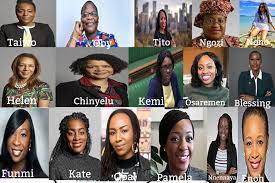
The political landscape in Nigeria, like in many countries, has historically been dominated by men. However, over the past few decades, there has been a significant push for increased political representation of women, aimed at breaking the proverbial "glass ceiling."
This article delves into the complex journey of women's political representation in Nigeria, examining the challenges faced, the progress made, and the strategies employed to shatter the barriers that have hindered women's full participation in the country's political arena.
Historical Context
Nigeria's political history has been marked by a predominantly patriarchal system, where decision-making and leadership positions were traditionally reserved for men. The colonial legacy and subsequent societal norms perpetuated this gender imbalance, relegating women to the sidelines of political power.
This marginalization persisted even after Nigeria gained independence in 1960, with women severely underrepresented in legislative bodies and executive roles.
Challenges and Barriers
Several challenges have hindered women's participation in Nigerian politics:
Cultural and Societal Norms: Deep-rooted cultural and societal norms often relegated women to domestic roles and undermined their participation in public affairs. Traditional beliefs about women's roles as caregivers and homemakers have discouraged their involvement in politics.
Lack of Access to Education: Limited access to quality education in certain regions of Nigeria has disproportionately affected women, limiting their ability to acquire the skills and knowledge necessary for effective political engagement.
Financial Constraints: Politics often requires significant financial resources, and women in Nigeria have faced challenges in accessing these resources due to gender-based economic disparities.
Violence and Intimidation: Women in politics have faced violence, harassment, and intimidation, discouraging them from actively participating in the political process.
Party Structures: Political party structures in Nigeria have been male-dominated, making it difficult for women to secure nominations and support for electoral positions.
Progress Made
Despite these challenges, progress has been made in recent years:
Legal Reforms: Nigeria has implemented legal measures to promote gender equality and women's participation in politics. The National Gender Policy and the National Gender Plan of Action are significant steps towards achieving this goal.
Quota Systems: Some political parties and regions have adopted quota systems to increase women's representation. For example, the Women's Political Empowerment Framework set a target of 35% women's representation in political appointments.
Successful Women Leaders: The rise of women leaders, such as Ngozi Okonjo-Iweala, who became the Director-General of the World Trade Organization, has inspired other Nigerian women to aspire to leadership positions.
Civil Society and Advocacy: Civil society organizations and advocacy groups have played a crucial role in raising awareness about gender inequality in politics and pushing for policy changes.
Strategies for Breaking the Glass Ceiling
To further enhance women's political representation in Nigeria, several strategies can be employed:
Education and Awareness: Promoting education and raising awareness about the importance of women's participation in politics can challenge traditional stereotypes and encourage women to get involved.
Capacity Building: Providing training and capacity-building programs can equip women with the skills needed for effective political leadership.
Electoral Reforms: Implementing electoral reforms that promote inclusivity, such as more transparent nomination processes and stricter enforcement of gender quotas, can increase women's representation.
Addressing Violence: Creating a safe political environment through stringent measures against violence and intimidation can encourage more women to enter politics without fear.
Mentorship and Networking: Establishing mentorship programs and networking opportunities can connect aspiring women politicians with experienced leaders, fostering skill development and support.
Conclusion
The journey towards breaking the glass ceiling in political representation for women in Nigeria has been marked by challenges and successes. While cultural, economic, and societal barriers have impeded progress, legal reforms, quota systems, and increasing women's leadership roles have created a more favorable environment for women's political participation.
Continued efforts, including education, advocacy, and targeted reforms, are essential to ensure that women's voices are heard and their perspectives are adequately represented in Nigeria's political landscape.
Ultimately, achieving gender parity in political representation will not only benefit women but also contribute to more comprehensive and inclusive governance for the entire nation.




















